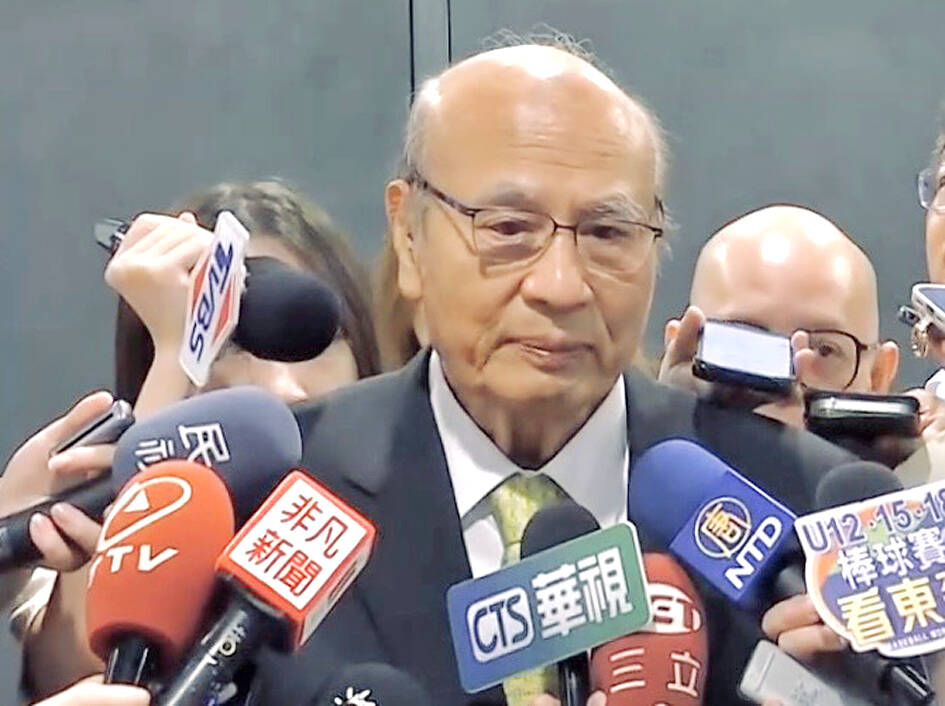The Chinese National Federation of Industries (CNFI, 全國工業總會) yesterday urged the government to halt electricity rate hikes slated for next month, saying local businesses are already under strain from steep US tariffs and exchange rate volatility.
The Taipei-based group made the appeal as the electricity rate review committee prepares to meet later this month, with new rates set to take effect next month.
State-run Taiwan Power Co (Taipower, 台電) is struggling to stay afloat after legislators blocked the government’s proposed NT$100 billion (US$3.26 billion) subsidy program. Taipower has accumulated about NT$418 billion in losses due to surging fuel costs, pushing its debt-to-equity ratio to 92.8 percent as of July 31.

Photo: Liao Chia-ning, Taipei Times
The electricity rate review committee in March unexpectedly kept electricity rates unchanged as the government sought to contain economic uncertainty and maintain price stability amid tariff concerns. Still, electricity prices for industrial users have surged 66 percent over the past three years.
“Electricity prices should definitely not rise again. Any further hikes would place an additional financial burden on the public,” CNFI chairman Pan Chun-jung (潘俊榮) said on the sidelines of the group’s white paper release.
Pan urged the legislature to support the government’s subsidy program, saying it would strengthen Taiwan’s electricity resilience.
Energy policy is among the top concerns of CNFI members, with 52.4 percent expressing serious concern over the issue, the white paper said.
As the industrial sector accounts for 55 percent of the nation’s power consumption, the group called on the government to reassess its energy development policy within a 10-year timeframe to ensure a stable supply.
All options, including coal, natural gas, renewable energy and nuclear power, should remain on the table, it said.
The CNFI also said it supports raising the minimum wage in line with consumer price growth and a slowing economy, but stressed that increases must remain “bearable” for local businesses, Pan said.
While the US’ 20 percent tariff and stacking rates would have only a mild effect on the semiconductor and information and communications technology sectors, they would place a significant strain on the growth of small and medium-sized enterprises, they said.
Along with a strong New Taiwan dollar, the cost pressures have become “almost unbearable” for smaller firms and those in traditional industries, CNFI vice chairman Dennis Chen (陳進財) said, adding that the economy could face a slowdown if manufacturing activity continues to contract and more workers are placed on unpaid leave.
Government data showed that as of the end of last month, the number of furloughed workers had risen to 4,863, with more than 62 percent of companies citing the impact of US tariffs as the main reason.

On Tuesday, US President Donald Trump weighed in on a pressing national issue: The rebranding of a restaurant chain. Last week, Cracker Barrel, a Tennessee company whose nationwide locations lean heavily on a cozy, old-timey aesthetic — “rocking chairs on the porch, a warm fire in the hearth, peg games on the table” — announced it was updating its logo. Uncle Herschel, the man who once appeared next to the letters with a barrel, was gone. It sparked ire on the right, with Donald Trump Jr leading a charge against the rebranding: “WTF is wrong with Cracker Barrel?!” Later, Trump Sr weighed

HEADWINDS: Upfront investment is unavoidable in the merger, but cost savings would materialize over time, TS Financial Holding Co president Welch Lin said TS Financial Holding Co (台新新光金控) said it would take about two years before the benefits of its merger with Shin Kong Financial Holding Co (新光金控) become evident, as the group prioritizes the consolidation of its major subsidiaries. “The group’s priority is to complete the consolidation of different subsidiaries,” Welch Lin (林維俊), president of the nation’s fourth-largest financial conglomerate by assets, told reporters during its first earnings briefing since the merger took effect on July 24. The asset management units are scheduled to merge in November, followed by life insurance in January next year and securities operations in April, Lin said. Banking integration,

LOOPHOLES: The move is to end a break that was aiding foreign producers without any similar benefit for US manufacturers, the US Department of Commerce said US President Donald Trump’s administration would make it harder for Samsung Electronics Co and SK Hynix Inc to ship critical equipment to their chipmaking operations in China, dealing a potential blow to the companies’ production in the world’s largest semiconductor market. The US Department of Commerce in a notice published on Friday said that it was revoking waivers for Samsung and SK Hynix to use US technologies in their Chinese operations. The companies had been operating in China under regulations that allow them to import chipmaking equipment without applying for a new license each time. The move would revise what is known

Artificial intelligence (AI) chip designer Cambricon Technologies Corp (寒武紀科技) plunged almost 9 percent after warning investors about a doubling in its share price over just a month, a record gain that helped fuel a US$1 trillion Chinese market rally. Cambricon triggered the selloff with a Thursday filing in which it dispelled talk about nonexistent products in the pipeline, reminded investors it labors under US sanctions, and stressed the difficulties of ascending the technology ladder. The Shanghai-listed company’s stock dived by the most since April in early yesterday trading, while the market stood largely unchanged. The litany of warnings underscores growing scrutiny of